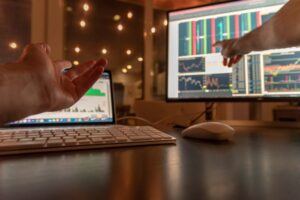Share this article:
Bad Trading Psychology Can Lead To Many Types of Trading Mistakes
A lot of traders who are just starting out in the business have a tendency to overthink their trades and be too cautious because they don't want to make any mistakes. This can be problematic for two reasons, the first being that it can lead to indecision which will cause them to miss out on some great opportunities. The second reason is that this mindset leads people down a path of self-sabotage as it makes them more likely to experience losses when things go wrong.
The best thing you can do if you find yourself in this situation is take some time and work on your trading psychology so that you're not putting pressure on yourself every time you trade.

Most traders are unaware of the psychological issues that are holding them back from successful trading. Here are some principles to help you to get a leg up on the markets.
Trading is a Zero Sum Game
Trading is a zero sum game, which means that for every winner there is a loser. This may seem somewhat obvious, but it's important to keep in mind when you're reviewing your trades each day and making decisions on whether or not they were successful.
The best way to think of this concept is by looking at the following example: imagine if two people are playing rock-paper-scissors with one throwing out "rock" and the other responding with "paper." The player who threw out rock wins because their symbol beat paper - but the person who responded with paper doesn't win anything because paper isn't stronger than rock. It might be tempting to want both players to win, but unfortunately it just doesn't work like that!
In every trade there is one person that believes with that the price will go higher and another person equally convinced that the price will go lower. They both cannot be right. For this reason, it is important to make sure that you have rock solid analysis and that you have a stop loss in place just in case the trade goes against you.
It is Important To Know Your Risk Tolerance Before Trading
It is important to know your risk tolerance before trading because there are a variety of strategies that can be employed. If you take too much risk, then if a trade does not work out and it will cost more to get back to your original investment point than if you took less risk in the first place.
Current trading psychology principles often overlook our own flaws as traders: we overestimate how good we are at predicting price movement without being able to clearly see past biases; make decisions based on emotions rather than logic; don't think about what happens when all trades move against us (i.e., stop loss) or have a plan for managing winning trades with only small profits "just in case".
You Need to be Aware of the Emotional Side of Trading and How it Can Affect Your Decisions
You need to be away of the emotional side of trading and how it can affect your decisions because it can change your perception of the trade. When you're feeling good about a trade, you may be more likely to put on additional trades with the same set up that has been working out well for it. Similarly, when you are in an emotional state such as anger or sadness due to recent events, trading might not seem so appealing and this could cause us to take decisions we normally wouldn't make because they don't feel right at that time.
As we get over excited about a new trend, we will want to add more shares than usual since momentum is carrying us higher into what seems like sure money...but this isn't always the case. In fact, this can lead to over confidence and create a situation where we put on too much risk and take a larger than normal loss because we are "sure" that our analysis is correct.
This is the easiest way to lose money and erase some or all of the gains you have made during your trading session.
Traders Often Have an Irrational Fear of Missing Out on Profit Opportunities
Many traders have an irrational fear of missing out on profit opportunities that are not even available, and this can lead them to make decisions they wouldn't ordinarily make. This could be because we don't want another opportunity disappear without us having taken advantage of it or wanting to take the risk in case there is a chance you will win big time which would then justify all your losses incurred during previous trades.
The problem with either way of thinking is that trading success isn't always about making lots of low-risk high-reward trades - sometimes it's just as important (if not more) to focus on limiting losses when things go wrong. The best traders know how much risk their account balance can handle at any one time...and they do their best to remained disciplined with the amount of risk they take on any given trade.
If you want to be successful over the long run, the idea that you are missing out on money because you have not taken a specific trade should leave your mind for good.
There are Many Different Types of Traders, Each With Their Own personality traits
It is important for you to know which trading type fits your personality because that will dictate what you should focus on when trading.
The idea of turning a profit over the long run is not about making money, it's about keeping your losses small and limiting them as much as possible. If you do this then in time, those profits that are made from winning trades will add up to something substantial enough for a trader to live off of.
A little patience can go along way in becoming successful with trading; be patient and don't give into greed because sooner or later it will catch up to you. You need discipline if want to learn how trade successfully--it takes an entire lifetime worth of knowledge just waiting out there for anyone willing enough take their time and invest themselves.
Overthinking trades can be detrimental to your trading success. Trading is a game of probabilities where making mistakes will happen and the goal should not be perfection but rather taking calculated risks in order to come out ahead on more trades than you lose. If you are struggling with over thinking, we recommend trying some risk management techniques such as setting stop losses and using protective stops or moving averages. These principles help keep traders from losing too much money when things go wrong which makes them less likely to get discouraged by their failures and quit altogether.

Sign Up and Subscribe for quick updates!
Enter your name and email below to get notified of when the next blog post is released. It’s that easy.
Share this article:

PRODUCT
RESOURCES
We are not Financial Advisors or a Broker/Dealer: Neither Tradechology nor any of its officers, employees, representatives, agents, or independent contractors are, in such capacities, licensed financial advisors, registered investment advisers, or registered broker-dealers. MLH Capital does not provide investment or financial advice or make investment recommendations, nor is it in the business of transacting trades, nor does it direct client commodity accounts or give commodity trading advice tailored to any particular client’s situation. Nothing contained in this communication constitutes a solicitation, recommendation, promotion, endorsement, or offer by MLH Capital of any particular security, transaction, or investment.
Securities Used as Examples: The securities used in this example are used for illustrative purposes only. The calculation used to determine the return on investment “ROI” does not include the number of trades, commissions, or any other factors used to determine ROI. The ROI calculation measures the profitability of investment and, as such, there are alternate methods to calculate/express it. All information provided are for educational purposes only and does not imply, express, or guarantee future returns. Past performance shown in examples may not be indicative of future performance. Testimonials appearing on this website may not be representative of other clients or customers and is not a guarantee of future performance or success.
Investing Risk: Trading securities can involve high risk and the loss of any funds invested. Investment information provided may not be appropriate for all investors and is provided without respect to individual investor financial sophistication, financial situation, investing time horizon, or risk tolerance.
Testimonials appearing on this website may not be representative of other clients or customers and is not a guarantee of future performance or success



